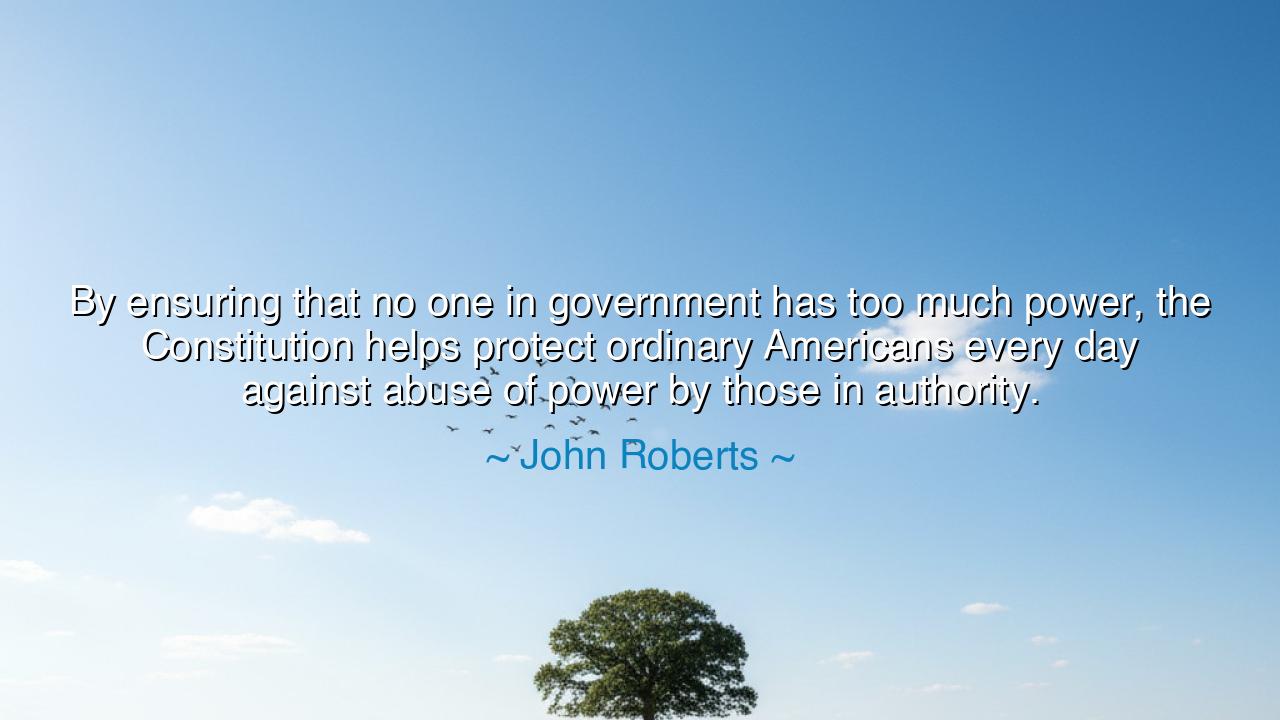
By ensuring that no one in government has too much power, the
By ensuring that no one in government has too much power, the Constitution helps protect ordinary Americans every day against abuse of power by those in authority.






When Chief Justice John Roberts said, “By ensuring that no one in government has too much power, the Constitution helps protect ordinary Americans every day against abuse of power by those in authority,” he was speaking not merely as a jurist, but as a guardian of the Republic’s ancient covenant. His words are a reminder that liberty is not preserved by passion or promise, but by structure — by the deliberate division of power that prevents any one hand from gripping the throat of the nation. This quote, simple yet profound, speaks to the timeless truth that unchecked authority is the enemy of freedom, and that the genius of the Constitution lies in its balance, its restraint, and its eternal mistrust of absolute power.
The origin of this idea reaches back to the very dawn of the American experiment. The Founding Fathers, having tasted the tyranny of monarchy and the chaos of weak government, forged a system built on separation of powers — three branches, each distinct, each vigilant, each capable of limiting the others. They understood that human nature, left unbounded, tends toward dominance. Thus, they crafted a Constitution that did not trust men with power, but compelled them to check one another through law. As James Madison wrote in Federalist No. 51, “Ambition must be made to counteract ambition.” Roberts’ reflection is a modern echo of that ancient warning: power, like fire, can warm and protect, but without control, it consumes.
The meaning of his words lies in the invisible armor that the Constitution wraps around every citizen. For it is not the loud cries of freedom that preserve liberty, but the quiet functioning of law — the careful balancing of institutions that keeps corruption in check. Every day, unseen by most, courts restrain executive excesses, legislatures expose wrongdoing, and citizens exercise their right to speak, protest, and vote. The Constitution, through its intricate design, stands as the silent guardian of the people’s dignity. Roberts reminds us that this protection is not theoretical; it is living, breathing, and vital — a fortress built not of stone, but of principles that have endured wars, crises, and revolutions.
History offers a mirror to the wisdom of his words. Consider the story of Richard Nixon and the Watergate scandal — a dark moment when power sought to conceal its own corruption. It was not the fury of the mob that restored justice, but the strength of constitutional order. The courts, independent and fearless, demanded the release of the tapes; Congress, bound by duty, held the executive to account; and the people, awakened by truth, reclaimed their faith in the Republic. This was the Constitution in motion — the balance of power shielding the governed from the arrogance of the governors. Without it, the presidency might have become a throne, and democracy, a memory.
Roberts’ message is thus both a celebration and a warning. The Constitution does not protect itself; it depends upon the vigilance of those who serve it — and the awareness of those it serves. When citizens grow indifferent to their freedoms, when they cease to question or to participate, the balance of power begins to tilt. Tyranny rarely announces its arrival; it creeps quietly, disguised as convenience or safety, until the people awake to find the chains already forged. To preserve liberty, one must understand it — not as a gift from government, but as a birthright secured through constant defense.
His words also speak to the sacred duty of humility among those in authority. For power is a trust, not a possession. The Constitution demands that even the mightiest bow before the law, that presidents and judges and legislators alike remain servants, not masters, of the people. When Roberts speaks of protecting “ordinary Americans,” he means that in this nation, no one is too small to be defended, and no one is too great to be restrained. That is the miracle of constitutional government — that justice, not might, holds dominion.
The lesson, therefore, is eternal: freedom is maintained not by passion, but by principle; not by men, but by laws that men must obey. Each generation inherits this balance as both a blessing and a burden. Citizens must know their rights, question their leaders, and cherish the delicate system that keeps authority in check. To preserve liberty, they must guard against both tyranny from above and apathy from within. For once the scales of power are unbalanced, they are not easily righted again.
So let these words of John Roberts echo like a vow: a strong Constitution makes a strong people. As long as power is divided, as long as justice remains blind and fearless, the spirit of freedom will not perish. Remember always that respect for law is not weakness, but strength — the strength that protects the humble, restrains the mighty, and binds the destiny of all under one eternal truth: that no man, no office, no government, stands above the sacred authority of the people’s liberty.






AAdministratorAdministrator
Welcome, honored guests. Please leave a comment, we will respond soon